I come to you with only Karate empty hands.
I have no weapons, but should I be forced to defend myself, my principles or my honor.
Should it be a matter of life or death, of right or wrong
Then here are my weapons, Karate, my empty hands.
Ed Parker Sr – Founder of American Kenpo Karate
Those were the words I remember hearing the first time I took part in a karate class.
That was almost four decades ago. We trained in a large room inside of an air force base recreation center. The class was filled mostly with young airmen, but a few kids also stood in line.
I was one of those kids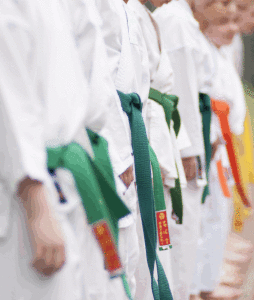 . That was the beginning of my martial arts journey.
. That was the beginning of my martial arts journey.
Actually, my journey began a few days before that. I was walking with my friend, Bill, when someone he knew stopped us. Well, he stopped Bill. I just happened to be there. This stranger had opened his own karate school and wanted to know if Bill was interested in stopping in. Since I was standing there at the time, I was invited too.
Until that moment, I had no interest in karate. The entire basis of my martial arts background at that point had been to watch David Carradine’s Kung Fu on TV, but suddenly this stranger had my attention. I was going to learn to fight like Kwai Chang Caine. I was going to be an awesome fighting machine.
Yeah. Exactly.
That stranger was Sifu Anthony Preston, and the style he taught was called Commando Karate. Sadly, I know little about the origins of this style beyond the fact that it had its roots in the Philippines.
I was not the best student. I was young and easily distracted.
I never learned to fight like an ancient Shaolin monk. My family moved out of the area a few years later, and it looked like my time studying karate had come to an end.
Except it didn’t. A few months after moving to our new home, I was exploring the neighborhood when I noticed a handmade sign at the local community center for the Vernon Karate Club. A few days later I was standing at the door to the dojo and introducing myself to Roger Vernon. He was the instructor, what they called a Sensei, but at that time I had no concept of what the word meant.
He taught Shotokan, another word that meant nothing to me. All I knew is that it was a form of karate, and that the instructor and students all seemed friendly. I wanted to join immediately, but before I could take a class I needed to have my parents sign the application.
Needless to say there was much begging and pleading involved to get that signature. The classes were $25 a month, and at first my parents were reluctant to spend that on something I might just walk away from at any time. My track record with other activities wasn’t that great, and even during my time studying Commando Karate my attendance was always a bit sketchy. I had to promise to do better. They signed the form.
Kids and promises.
You probably have a good idea how that turned out, at least after the first month. I would get distracted and miss a class. Then another. It was during my third or fourth month of training at the Vernon Karate Club, when I was considering blowing off another class to do pretty much nothing, that I made a decision that would change my life forever.
It was time to put up or shut up. Either, I would commit to my training like I promised, or it was time to walk away.
I went to class that day, and I went to all of the classes after that. There were times when I would walk the 5 miles from home to the dojo to make a class. When I wasn’t training, I was reading. I tried to learn everything I could about Shotokan. When I finished everything I could find about Shotokan, I started reading about other styles.
Karate was no longer something I did for two hours a day, three times a week. It became part of everything I did.
I had become a martial artist.
Sensei Vernon, his family and the other students at the dojo weren’t just people I trained with. They became an extension of my family. I grew up in that dojo.
I eventually graduated from college and took a job 250 miles away from the dojo, but I continued to return to Sensei Vernon as often as I could until he retired.
For years after that I was like a vagabond in the martial arts community. I spent time training at more schools than I can remember. It was great being exposed to all of those different styles, but I struggled to find a dojo that I felt comfortable at. I compared everything to my experience at the Vernon Karate Club. I wasn’t ready to move on.
The words of Bruce Lee come to mind. “Empty your cup so that it may be filled; become devoid to gain totality.” My cup was full, and unless I emptied it I would be stuck.
That was much harder than it sounds. Apparently my cup wasn’t just full, it had a lid on it to keep everything from spilling out. It also stopped anything from getting in.
It wasn’t until I introduced my son to karate at a school that taught a version of Kenpo that I managed to loosen that lid. Sharing that experience with him, reminded me of what I really wanted from a karate school.
It wasn’t the techniques or the physical conditioning that drove me. Don’t get me wrong. I love that feeling after a good workout (even if I hate it when I’m doing it), and I crave learning new things like an addict searching for his next fix, but that isn’t what keeps me at a dojo.
It’s the people that make the difference. I gained a huge appreciation for the instructors as I watched them work with the kids. They were patient, kind, serious and funny. They kept the kids focused and learning, not just how to throw a kick or a punch, but about confidence and discipline and a host of other mental benefits that we frequently associate with karate.
When the school invited the parents to join a class for a month, I found myself back on the dojo floor after several years of sitting on the sidelines, training under Mr Seth Bittner.
The adult workout left me tired and sore. Those early classes were frustrating.
My stamina wasn’t what it had been. My balance was off. My techniques were slow. I kept comparing myself to the last time I trained, and the comparison wasn’t good. It would have been easy to walk away, but one thing kept going through my head every time I felt like giving up. “It’s time to empty your cup.”
That was my silent mantra before every class. “Empty your cup. Only today matters.”
It’s been over three years since I started training at Action Karate Nazareth, and I’m still there, going strong. I don’t feel like I’m just a student there. I’m part of the karate community. Soon I’ll be testing for my black belt. This won’t be my first black belt, but it feels just as awesome and scary as when I prepared for that first test back in 1983.
And just like in 1983, this won’t be the end of my journey. It’s the first step on the new path I’ll be following.
You see, what I discovered is that when you empty your cup, you’re not pouring it onto the ground and losing it forever. You’re pouring it into a bigger cup.
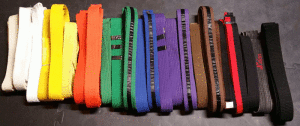
Besides being a martial artist, Keith Keffer is also a science fiction and fantasy author. You can find out more about Keith by visiting his website at keithkeffer.com.


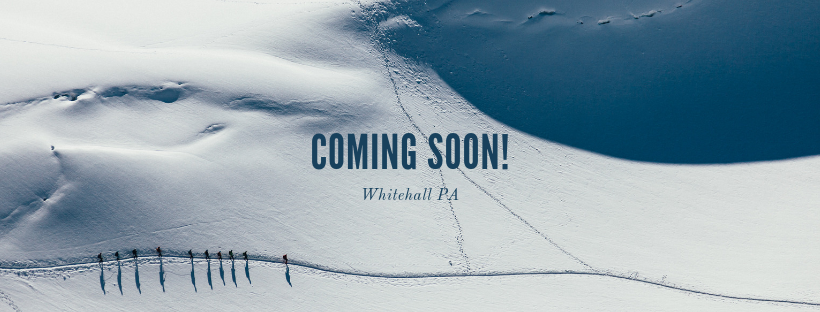
![]()
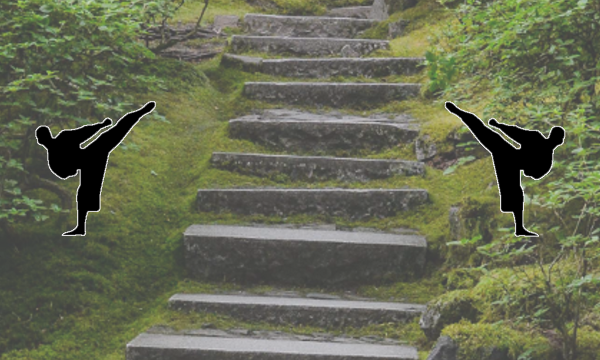

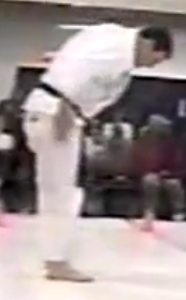 Bowing is simply a physical movement. It may serve as a reminder that karate begins and ends with respect, but by itself it is not respect. It is the intent in which the action is performed that defines its purpose. Bending at the waist is not enough. I do that when I tie my shoes.
Bowing is simply a physical movement. It may serve as a reminder that karate begins and ends with respect, but by itself it is not respect. It is the intent in which the action is performed that defines its purpose. Bending at the waist is not enough. I do that when I tie my shoes. . That was the beginning of my martial arts journey.
. That was the beginning of my martial arts journey.